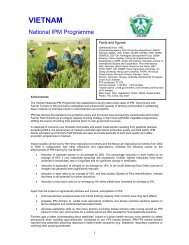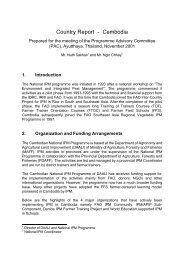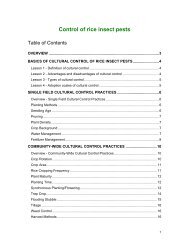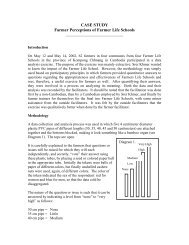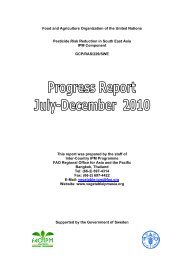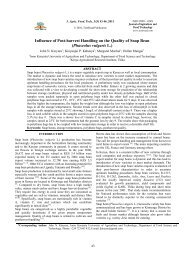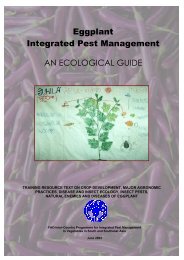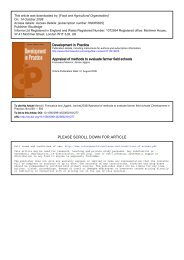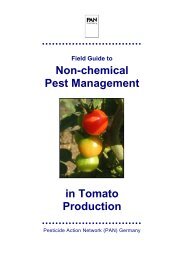Cabbage Integrated Pest Management : An Ecological Guide.
Cabbage Integrated Pest Management : An Ecological Guide.
Cabbage Integrated Pest Management : An Ecological Guide.
You also want an ePaper? Increase the reach of your titles
YUMPU automatically turns print PDFs into web optimized ePapers that Google loves.
Weed <strong>Management</strong>weed problems on an individual basis. There are some weeds for which 100% control may be desirablebecause they are particularly competitive, persistent, or difficult to control. Identification of weed speciesis therefore a first step in weed management.Weed management should also be related to growth stage. It may be necessary to go for 100% weedcontrol in the first few weeks after transplanting but when plants are fully grown, some weeds may betolerated. Such weed-free period is called the critical weed-free period, a concept explained below.Critical weed - free periodThe critical weed-free period is the minimum length of time during which the crop should be practicallyweed-free to avoid a yield or quality reduction. The critical weed-free period varies with crop, weed speciesand environment. The critical weed-free period concept is based on the following observations: Atthe time of field preparation and planting, the field is virtually free of weeds. Soon after, however, weedseeds brought to the surface by field preparation start to germinate.At some point, crop seedlings and weeds are large enough to compete for light, water and nutrients.Weeds usually win this competition, marking the beginning of the critical weed-free period. Young seedlingsthat have to compete with weeds for nutrients and light may form weaker plants. Weaker plants are moresusceptible to pests and diseases and may eventually give lower yields. Economic losses will occur ifweeds are not controlled. The end of the critical weed-free period is generally several weeks later whenthe crop is large enough to shade late-emerging weed seedlings or is otherwise competitive with weeds.The critical weed-free period concept, does not mean that weeds can be ignored except during thecritical period, however. If no provisions have been made to reduce weeds (e.g. by use of mulches, seesection 9.4 below), weeds may be very difficult to control by the beginning of the critical period, with orwithout herbicides. <strong>An</strong>other consideration is that weeds present after the end of the weed-free periodmay not reduce yield but can make harvest difficult.For vegetables in general a critical weed-free period is the first 4 to 6 weeks after crops are planted. Forcabbage this period can be shorter: 3 to 4 weeks after transplanting.(Peet, www6).9.4 Prevention of weed problems : some tactics“The best control is prevention” is also valid for weed management.Some tactics for weed prevention :· Crop rotation is an effective practices for long-term weed control. Crop rotation alone is usually notsufficient to control weeds, but it does introduce conditions and practices that are not favorable for aspecific weed species, reducing growth and reproduction of that species. Crop rotation provides theopportunity to plant competitive crops which prevent weed establishment. Rotation to a denselyplanted crop such as alfalfa or small grains helps prevent most annual weeds from becomingestablished and producing seed and it helps reducing populations of some perennial weeds.In addition, some weed problems are more easily managed in some crops than others becausedifferent control options may be available. Crop rotation also helps disrupt weed life cycles andprevents any single weed species from becoming firmly established.· Use uncontaminated vegetable seed and plant material.· Mulching is a very good and very commonly used method for both weed prevention and weed control.A mulch is any material placed on the surface of the soil, it can be organic matter such as straw or<strong>Cabbage</strong> <strong>Ecological</strong> <strong>Guide</strong> - 2000176



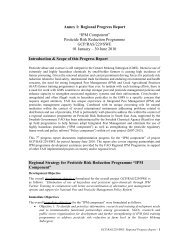
![Section 4 [ PDF file, 252 KB] - The Field Alliance](https://img.yumpu.com/51387260/1/158x260/section-4-pdf-file-252-kb-the-field-alliance.jpg?quality=85)
